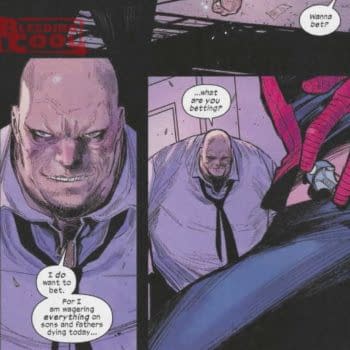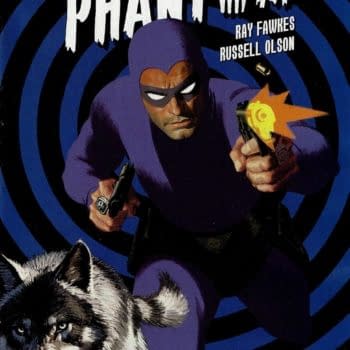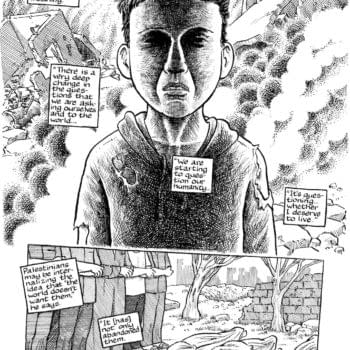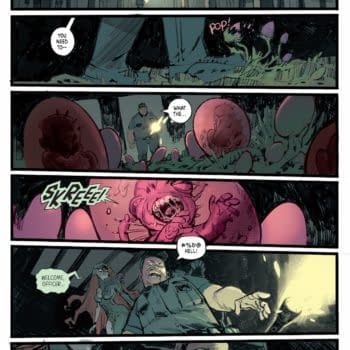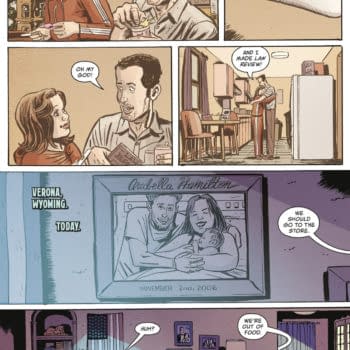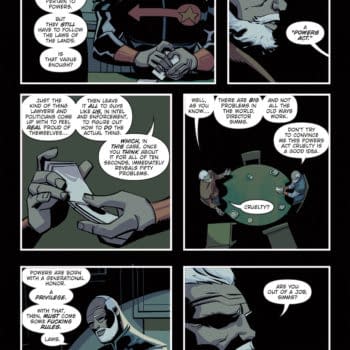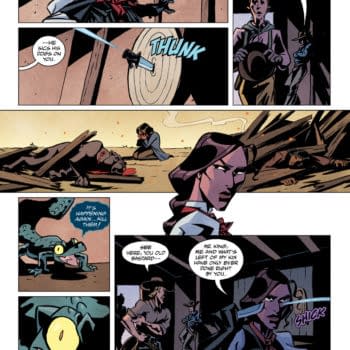Posted in: Comics | Tagged: cbldf, texas
CBLDF Sees Texas Government Book Ratings Law Declared Unconstitutional
The CBLDF sees the Texas government book ratings law, the Restricting Explicit and Adult-Designated Educational Resources Act, declared unconstitutional
The Comic Book Legal Defense Fund, or CBLDF, has claimed victory in a lawsuit to strike down Texas HB900, or the Restricting Explicit and Adult-Designated Educational Resources Act (the READER Act), a recently enacted law that seeks to impose a ratings system on books distributed to Texas schools. Graphic novels were specifically targeted by those promoting the legislation, and the CBLDF states that the ratings system would have worked as a government-mandated successor to the Comics Code. READER was designed to regulate access to what was defined as "sexually explicit" or "sexually relevant" materials in public school libraries, but what that would entail would be decided by the Texas State Library and Archives to establish content standards, the Texas Education Agency would oversee the standards, and and schools and bookstores would be required to comply with the rating system by categorizing all their materials.

The planned law was rejected as unconstitutional for attempting to compel speech, as well as for the standards used to assess books, which were deemed unconstitutionally vague, and for restricting the distribution of books as an unconstitutional prior restraint. Judge Alan D. Albright of the U.S. District Court for the Western District of Texas, Austin, has granted summary judgment and ordered a permanent injunction to block the mandatory book ratings law.
The CBLDF admits that there's a strong likelihood that the state will appeal the ruling to the Fifth Circuit, but also notes that the Fifth Circuit ruled in favour of the CBLDF and fellow litigants the last time the state tried to appeal the case. Judge Albright wrote that "READER can and does violate the First Amendment in several ways—the ways READER manages to violate the First Amendment are not mutually exclusive" and that it "compels speech, is void for vagueness, and is an unconstitutional prior restraint". For instance, Judge Albright stated that to do business with Texas public schools, vendors would need to surrender their First Amendment rights and assign ratings to books, regardless of their own beliefs, and books could be "re-rated" by the Texas Education Agency. Under such conditions, "Plaintiffs have no choice but to accept the government's speech," the judge wrote. That the legislation would require bookstores "to assign subjective, confusing, and unworkable Rating Requirements" and "encourages ad hoc judgments which can vary from bookseller to bookseller." He added "the government has the power to restrict what books its schools purchase, within the confines of the Constitution, and there is meaningful interest in curating content for children" and called the cause a "a good and noble one." But he concluded that "those powers should be exercised by the state directly, not by compelling third parties" and that "The Court agrees with Defendant's premise that Texas has an interest in safeguarding children against sexually explicit material—especially materials purchased with public funds for public schools. But the Court cannot agree with Defendant's assertion that Plaintiffs' First Amendment rights are not violated by READER." This suggests another route for those wanting to continue this push, to go down.
This comes after two years of litigation brought by two Texas bookstores, Austin's BookPeople and West Houston's Blue Willow Bookshop, as well as the American Booksellers Association, the Association of American Publishers, the Authors Guild and the Comic Book Legal Defense Fund. A joint press announcement from the book industry plaintiffs read, "Today's decision affirms the constitutional rights of authors, booksellers, publishers, and readers, and protects bookstores from the imposition of an unreasonable law that would have threatened their viability, making it a huge win for Texas businesses. We thank Judge Albright for a critically important ruling that is clear, concise, and extremely well-reasoned." The statement represents Valerie Koehler, owner of Houston's Blue Willow Bookshop; Gregory Day, interim general manager of Austin's BookPeople; Allison Hill, American Booksellers Association CEO; Maria Pallante, Association of American Publishers president and CEO; Mary Rasenberger; Authors Guild CEO; and Jeff Trexler, Comic Book Legal Defense Fund interim director. They were supported during litigation with amicus briefs filed by the American Association of School Librarians, the Association of University Presses, Barnes & Noble the Educational Book and Media Association, Freedom to Learn Advocates, and the Freedom to Read Foundation.
Authors Guild CEO Mary Rasenberger described the order as a necessary defence of intellectual freedom. "The government tried to force booksellers and publishers to become agents of state censorship, rating books according to unconstitutionally vague standards and then forcing them to adopt the state's own ratings as their speech. The law would have taken many books off shelves, with no meaningful appeal and no consideration of a work's educational value. The court recognised what we've argued all along: while there are constitutional ways to give parents input into their children's education, READER's forced ratings, government overrides, and prior censorship wasn't one of them."
CBLDF's Jeff Trexler acknowledged that other censorship battles are simmering and that the Texas Commissioner of Education may file a second appeal to the Fifth Circuit. But, he said, "I'll take the victories where we can get them. This case gets at the heart of what people in comics have been concerned about, because HB 900 is essentially a 21st-century Comics Code. Having to describe books as 'sexually explicit' affects the distribution and perception of those books. Graphic novels are a critical part of literacy today. If this law were to be enforced, we'd see graphic novels and manga get swept up in the legislation." He cited attempts to ban Jerry Craft's New Kid and its sequels, along with widespread censorship of graphic narrative adaptations such as Ari Folman and David Polonsky's Anne Frank's Diary and Margaret Atwood and Renee Nault's The Handmaid's Tale."
While my take is probably asking what tortuous naming procedure led the legislators to reach the READER acronym in 2023… it makes SHIELD, MASK or UNIT sound positively organic.







